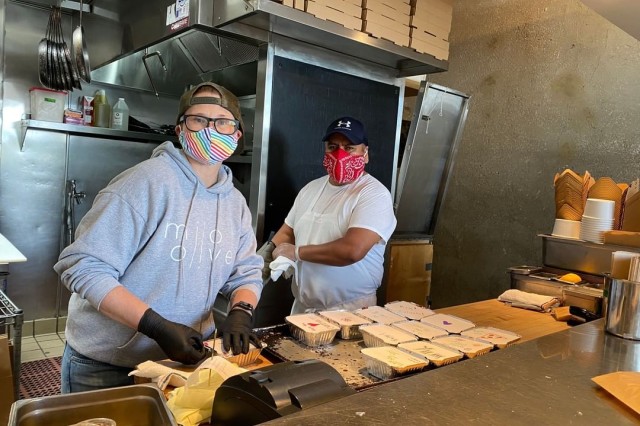
story
Karen Hirsch | Apron Strings Community Bake Shop
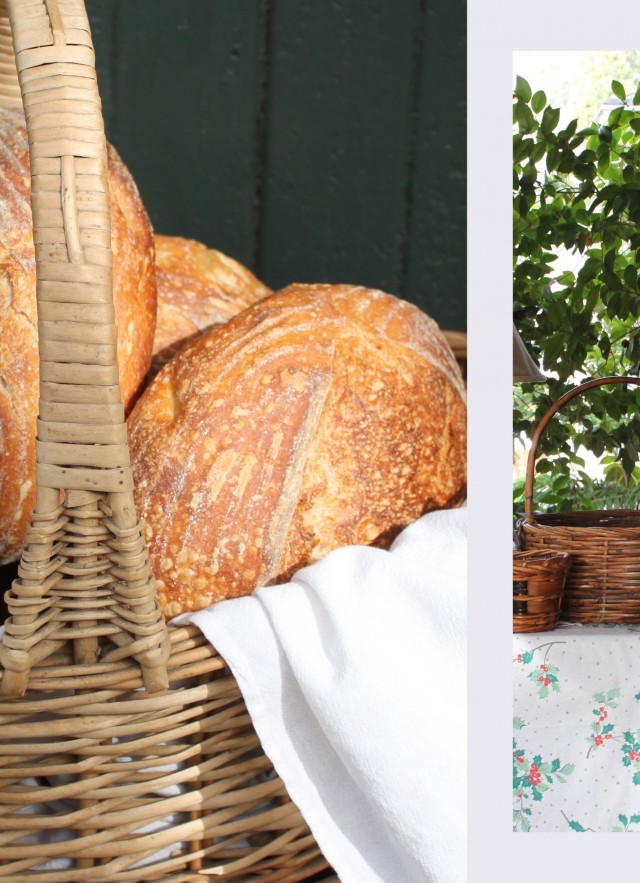
How do you connect with your ancestors and hold them in esteem? Karen Hirsch says: Make some bread! Karen is the founder and owner of Apron Strings Community Bake Shop, which specializes in naturally leavened breads and home-baked cookies. In an interview with Karen, she shares the power of bread-making memories and how she aims to be a community grandma—offering a first lump of dough to roll, shape, and bake. Her ethos is that everyone needs an elder guiding them through the process of learning, and Karen aims to fill that role as well as give back to her neighborhood of Pasadena, California.
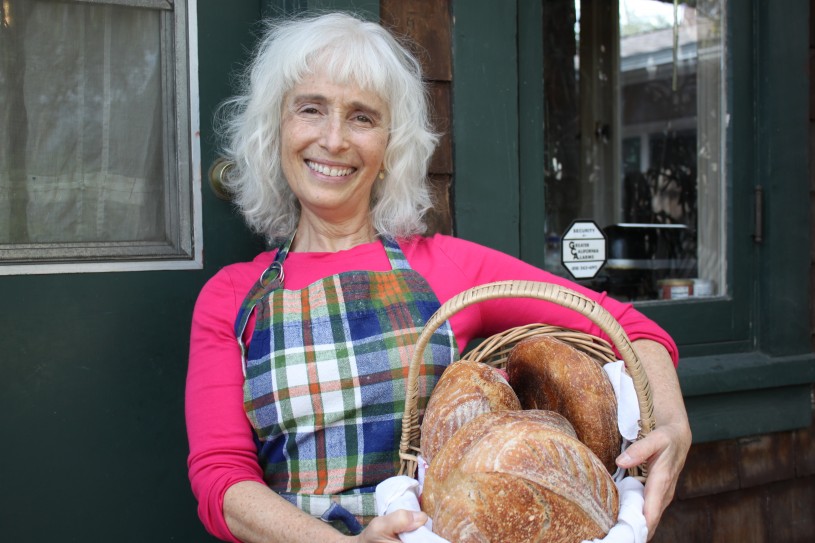
The more people who know how to bake, the more people will appreciate what goes into it. Maybe they even look at their ancestors differently—with more respect for the humble, domestic abilities to keep your family alive by baking bread.
Karen Hirsch
I was born in L.A., grew up in the San Fernando Valley, and later skipped over the hill to UCLA. My background was in theater, specifically as a production stage manager—it had always been my passion. At one point, I had this notion of getting my teaching credential and never expected that I would absolutely fall in love with teaching. I taught in LAUSD at Virgil Middle School in L.A. and then shifted gears to teach teachers with a small nonprofit organization in Koreatown. It was while I was there that my love of baking started.
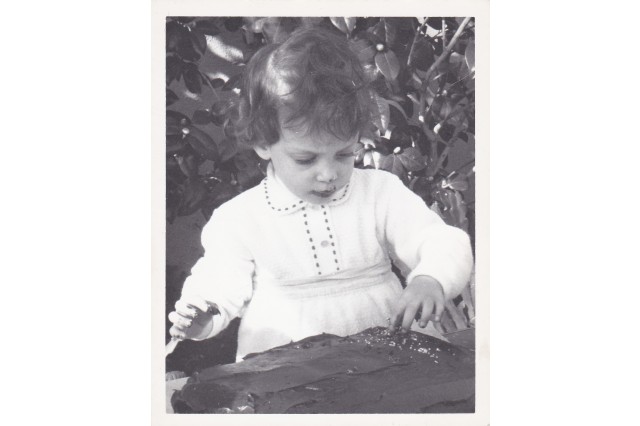
An early photo of Hirsch focusing on cake baking and decoration.

Karen Hirsch's grandmother was a baking inspiration all through Karen's childhood.
1 of 1
An early photo of Hirsch focusing on cake baking and decoration.
Karen Hirsch's grandmother was a baking inspiration all through Karen's childhood.
I started by wanting to create a space where there is a feeling of a grandmother or grandfather who would say, “I'm here to take care of you. Tell me your worries. Lay them on the table.” And I wanted to fill that table with chocolate chip cookies and a glass of milk. I had a little bit of nerve at one point—not sure where it came from—to take a sample basket of cookies to cafes in L.A. and Pasadena and ask if they were interested in sampling. And they all said yes, and that's how it began. Eventually, I discovered sourdough bread, which had not been part of my baking history—but fell in love with it, and it became a specialty. After five or six years, I felt like I now knew what I was doing with sourdough—enough to teach others.
In a way, my past theater experience, passion for education, and love of teaching became the foundation of sharing stories over bread. I found that I could use the teaching [skills] in my baking classes. My desire is that everybody has quality, exceptional food every day—whether I provide it or they make it themselves. My wish is to be like a grandma! When I was little, my grandma’s favorite saying in Yiddish was “es mayn kind! es!”, which is “eat my child! eat!” I think so many of us have memories of aunts and grandparents whose basic thing was to make sure we were fed.
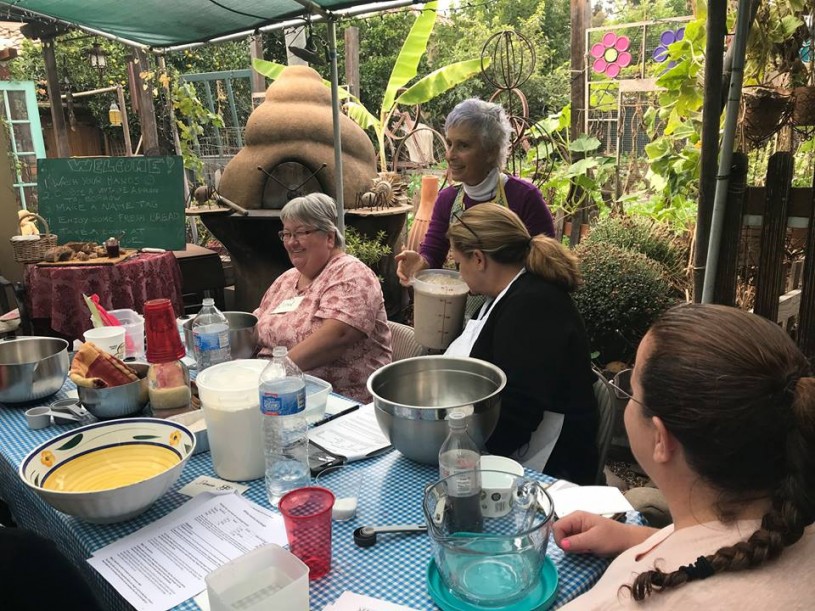
While teaching is exhausting, it is one of my favorite things to do. I keep classes small so that there can be a lot of individual attention. My goals are to demystify bread making and introduce that we all have a claim in the ancient heritage of flour and grain products—whether flat breads or risen breads.
What we are missing in modern-day society is that elder who is the first to offer you a little chunk of dough to play with and say, “now this is how you move the ball of dough around,” and “let me walk you through how to make your own ball with ingredients.” This is an important step because it's a long process to become proficient, and there is also an ingrained expectation to learn how to do this immediately. I try to bridge those two moments—the juxtaposition of, "I do not know how to do this complex work and I should be able to do this." So I start the class by discussing bread memories as a way to relax and set the tone that making bread is in your heritage. I try to be their elder in the room, reminding them that it might take some time to get the loaves they want.
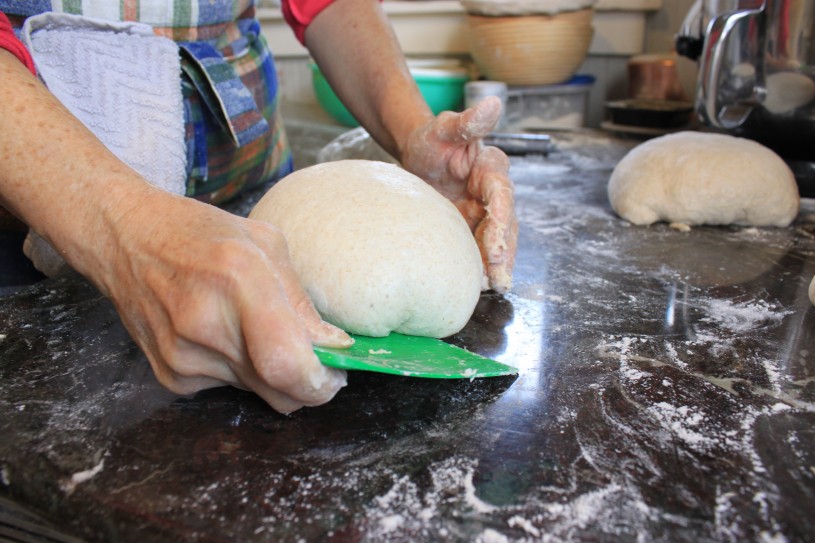
I take people through every single step from maintaining and caring for a continuous sourdough starter that you'll keep forever. Everyone walks away with a lump of dough to bake at home that day, so there is an immediate sense of success. My goal is also to set a sense of community among the people who attend that day, so they know how to connect with each other and with me after the class, things like, “Are you having this trouble? I'm having this trouble. Should we email Karen! Yes, this rises to the level where I have to consult with the elder.” And so, I offer technical support as a part of every class in perpetuity—you can contact me forever! If, for some reason, your sourdough starter dies, just contact me, and there'll be more for you. I am trying to develop this feeling of when we are all here for each other around food issues, no one has to go hungry.

Natural History Museum of Los Angeles County
Hirsch approaches her classes as the community elder in the room, imparting her knowledge and skills, but also gently encouraging participants that proficiency comes with time and practice.
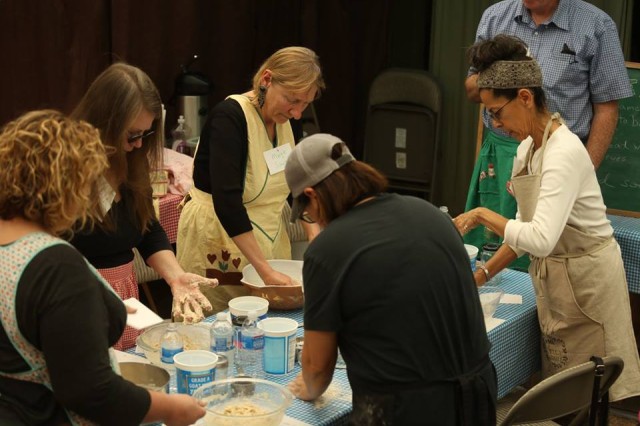
Apron Strings Community Bakeshop
Workshops are community driven, in that Karen encourages participants to connect with each other as they journey through the bread making process. This particular workshop was taught at the Dervaes Family Farm in Pasadena.
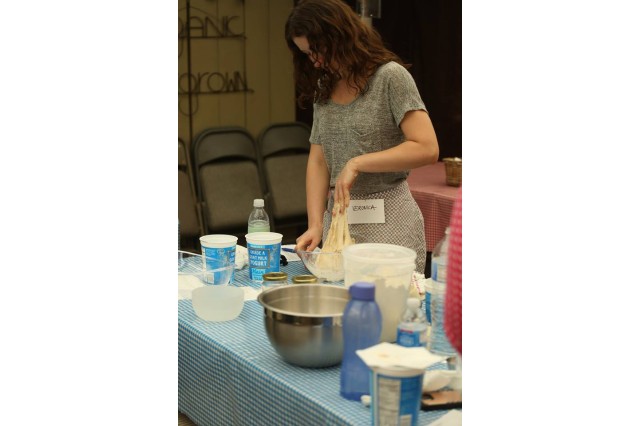
Apron Strings Community Bakeshop
Workshops are intended to bridge together the desire to make bread and temper the expectation that you should be good at it immediately.
1 of 1
Hirsch approaches her classes as the community elder in the room, imparting her knowledge and skills, but also gently encouraging participants that proficiency comes with time and practice.
Natural History Museum of Los Angeles County
Workshops are community driven, in that Karen encourages participants to connect with each other as they journey through the bread making process. This particular workshop was taught at the Dervaes Family Farm in Pasadena.
Apron Strings Community Bakeshop
Workshops are intended to bridge together the desire to make bread and temper the expectation that you should be good at it immediately.
Apron Strings Community Bakeshop
Yes, and it does feel like people are more reluctant because our wider culture doesn't really encourage community.. In this type of work, you are expected to reach out with questions. So when people write and say, “I'm so sorry to be bothering you,” I try to create a new paradigm and show that sharing what you are good at is exciting. I'm hoping that people, even in our weird, disconnected L.A., can find some sort of permission to ask questions.
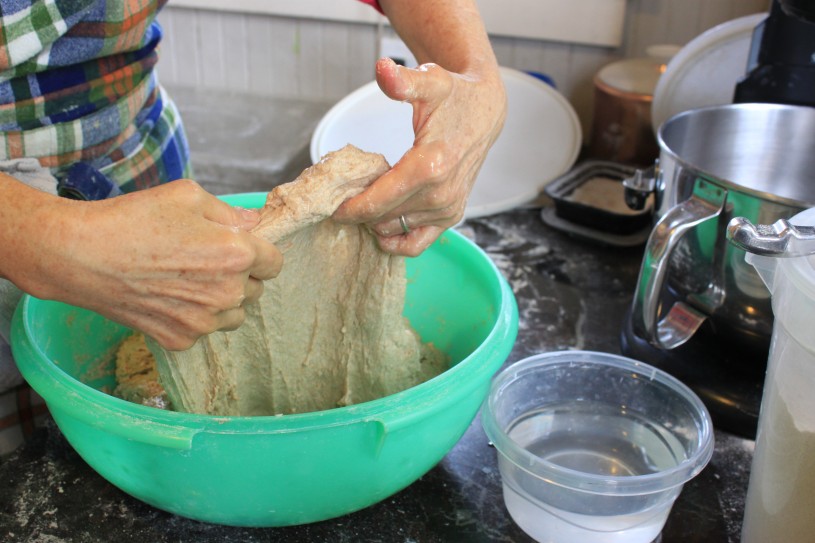
I was looking for a farmers market near my home and, most importantly, had afternoon hours. I am the type of baker who likes to serve people on their way home—not early in the morning, so the Altadena Farmers market was a good fit. In addition, the market had very specific goals of serving people of all economic levels—not just those who have money to buy organic or premium products. They were developing programs that provided access, like feeding seniors, dollar match programs, and attracting local communities from Pasadena and Altadena. I like this aspect because I would see the same people monthly.
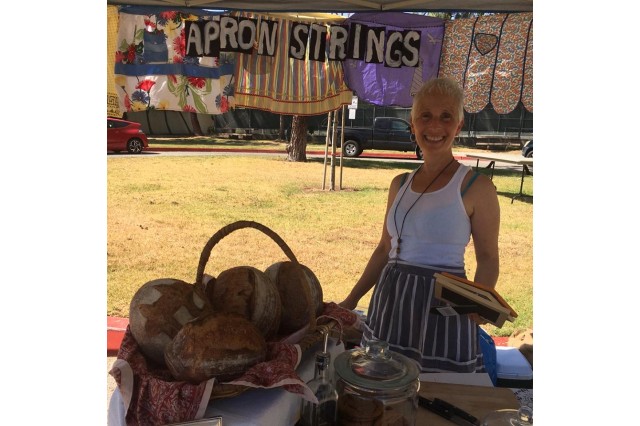
Apron Strings Community Bake Shop
Apron Strings vending at the local Altadena Farmer's Market.
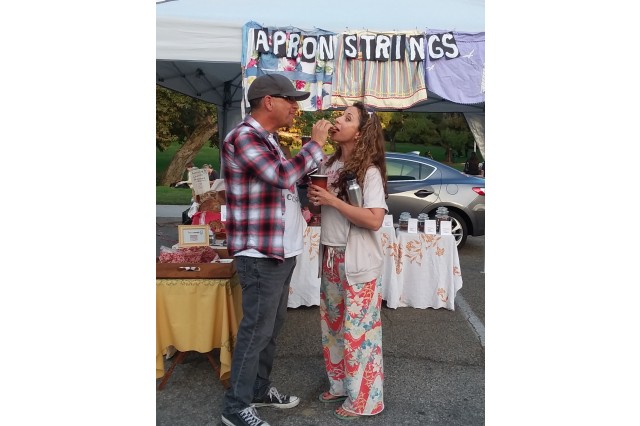
Apron Strings Community Bake Shop
Community members always return to Apron Strings Community Bake Shop for more treats.
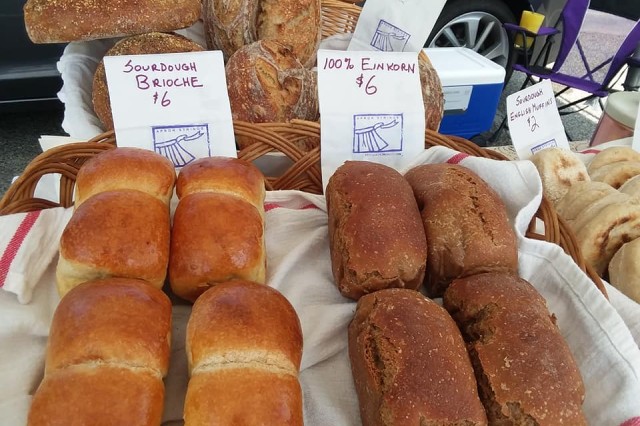
Apron Strings Community Bake Shop
Apron Strings Community Bake Shop is a cottage food bakery specializing in naturally leavened breads.
1 of 1
Apron Strings vending at the local Altadena Farmer's Market.
Apron Strings Community Bake Shop
Community members always return to Apron Strings Community Bake Shop for more treats.
Apron Strings Community Bake Shop
Apron Strings Community Bake Shop is a cottage food bakery specializing in naturally leavened breads.
Apron Strings Community Bake Shop
During the pandemic, I stopped going to the farmers market and focused on what I had wanted to develop all along, which was a front porch pickup. I wanted a visible physical place for the community to come, even though during COVID there was no way to linger over a cup of coffee. But I felt like I did serve as an anchor for people—especially at the beginning of the pandemic when bread was not on the shelves in the markets, and people could find bread here.
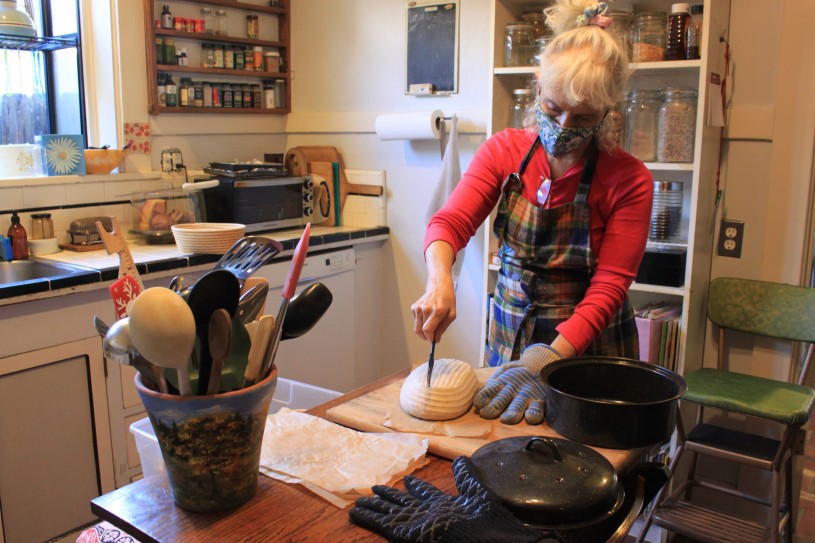
Sourdough bread is a slow food. While it is a hands-on food, the process of tending the dough also includes a sit and wait time. Because of the wait time built into the process, there are long, long stretches of time to sit and visit with each other to build community. There is time to teach a little one and show them what you are doing. I had people who visited me at the farmers market always ask me, 'if we all learn how to bake, won't that put you out of business?' And I thought, if only! If everyone were at home baking their own bread, that would be wonderful.
The more people who know how to bake, the more people will appreciate what goes into it. Maybe they even look at their ancestors differently—with more respect for the humble, domestic abilities to keep your family alive by baking bread. How do you connect with your ancestors and hold them in esteem? By doing some of the things that they did.
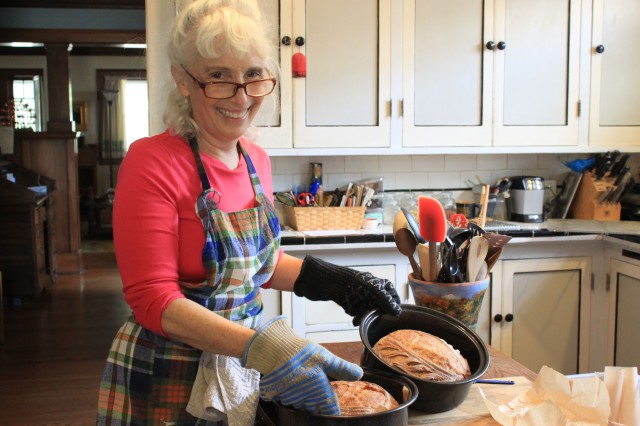
Natural History Museum of Los Angeles County
Karen Hirsch believes that baking is a way that anyone can connect to their ancestors.
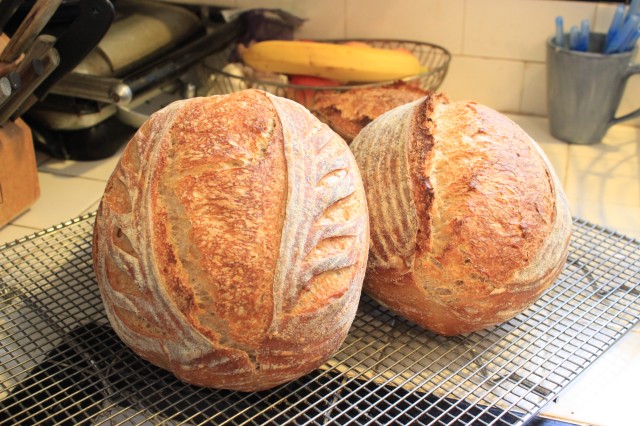
Natural History Museum of Los Angeles County
The sourdough loaves, freshly out of the oven, crackle and sing as they cool.
1 of 1
Karen Hirsch believes that baking is a way that anyone can connect to their ancestors.
Natural History Museum of Los Angeles County
The sourdough loaves, freshly out of the oven, crackle and sing as they cool.
Natural History Museum of Los Angeles County
When I am working on the bread, I see my grandmother's hands—it is what I wrote into my poem (see below). I wish so much that I had had greater consciousness while she was alive to ask her more questions. I wish I could have asked her questions about her childhood and history while I watched her knead or roll out dough. So the memory of her hands reminds me of how her whole adult life she was feeding people and keeping her eight children alive with these baked things—that is such a powerful memory.
I also think about being in the car with my dad or mother while driving to the bakery. I recall the smell of the bakery, then picking out what we needed, and on the way home, I would hold the warm bread in my hands while we talked, sometimes about difficult things. They would let me open the still-warm bread and pull out the heel of the bread to eat on the way home. So the aroma and flavor of the caraway seeds on rye bread are what I think about. I wish there were a video or audio of this time because I can’t imagine what we were talking about, but these were always the errands I wanted to do.
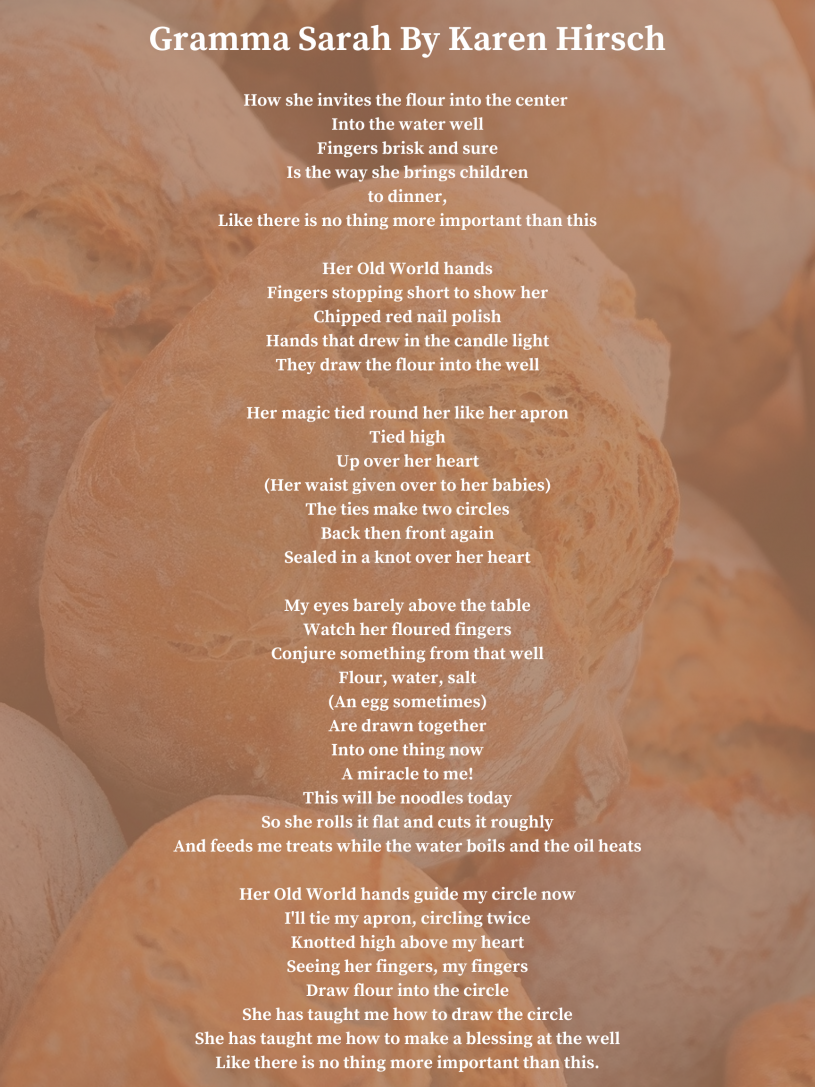
In 1995, when my husband and I were looking for a home, it was important to us to live in a connected community. We found that in Pasadena, people knew and cared about what was happening with their neighbors. And so we entered this community knowing that we did not have to do anything to make this community better—it was already here, and we would respect it. It was very satisfying to discover that I could contribute to the existing connected community with my bread. I wasn’t adding; I was enhancing what already existed. I would want people to know that I got lucky to fit into a community where I share my skills—not so much how I created a community. Pasadena is a special neighborhood, and I just feel so lucky to be a part of it.
The bread business itself has to contribute to the greater issue of equity. I set aside ten percent of the proceeds from every loaf of bread and cookie for Feed the Love. It is a collective that supports organizations focused on addressing justice and equity issues in our community. And it is amazing to see what people will contribute when their donation is part of a larger one—exciting things happen when you know you have more power together to make a difference. It's a mission of the business, but also a way to engage other people in doing the good work that they might not have done otherwise. We support hyperlocal organizations and others like My Tribe Rise, Pasadena Black Lives Matter’s Freedom School, and Raices.
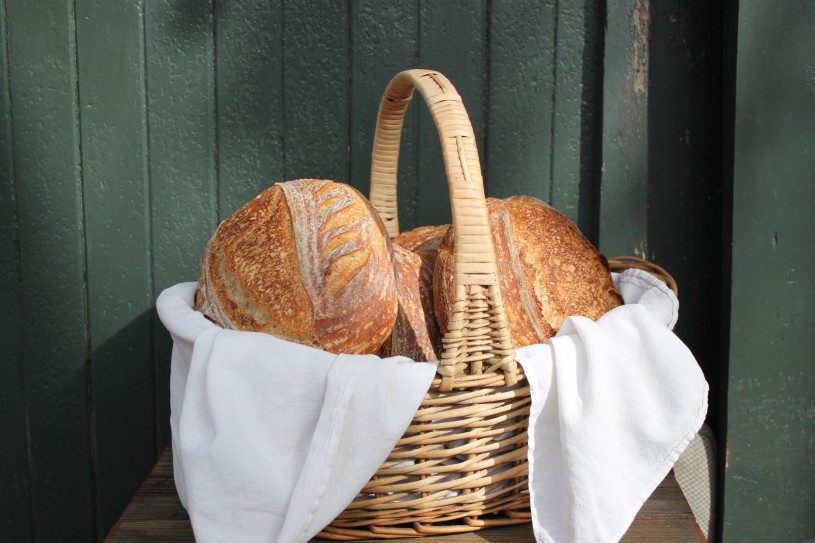
Click here to check out the Apron Strings Community Bake Shop's Facebook page for curbside orders and stay tuned for their upcoming return of workshops and farmers market pop-ups!
Have you visited Apron Strings Community Bake Shop or know of another L.A. breadmaker who lovingly connects with their community? We want to hear from you! Join the conversation on social media and tag us @NHMLA with #kneadedLA.
Following the success of Kneaded: L.A. Bread Stories, we're celebrating the history, heritage, and communities of Los Angeles through the lens of different cultural traditions. This year, L.A. at Play highlights the vibrant and visionary work of artisans who fabricate dolls and figurines using a variety of techniques and materials.